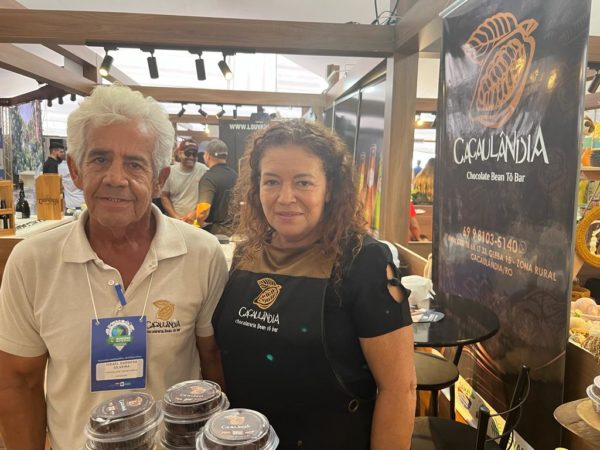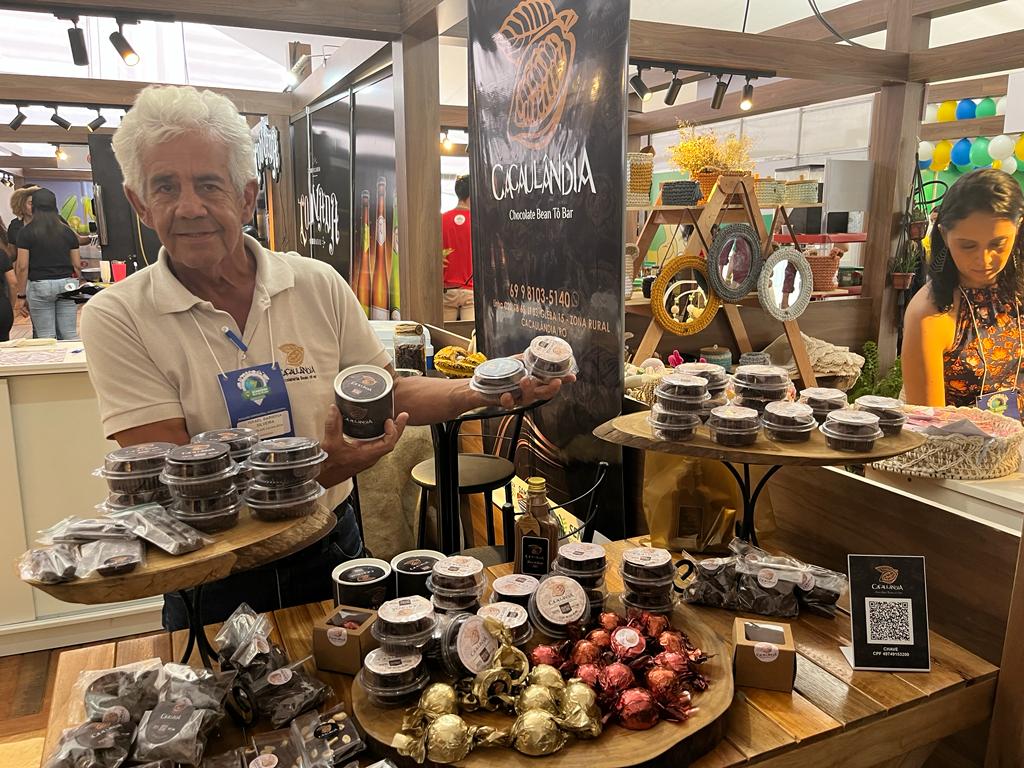Ji-Paraná – Cacaulândia is both a municipality and a bean-to-bar chocolate brand showcased at the Rondônia Rural Show in the state’s Economic Development Secretariat (SEDEC) pavilion. Cocoa producer Israel Barbosa Silveira (pictured above) told ANBA there are 3,000 hectares of cocoa planted in the state of Rondônia. In Cacaulândia, there are 100 producers. Only two produce bean-to-bar chocolate.
“Bean-to-bar is chocolate that uses all the cocoa butter and does not add anything else,” explained Silveira. According to him, many companies remove part of the cocoa butter to sell to the cosmetics industry and add oils to produce chocolate. In bean-to-bar, this does not happen.
Brazil’s Bean-to-Bar association defines it as chocolate made from the whole cocoa bean to the chocolate bar, without segmentation of processes or additives, free of artificial preservatives, artificial flavorings, transgenic fats, hydrogenated fats, and artificial emulsifiers. Also, the processing from the cocoa beans to the bar is performed by the same company. The idea is to offer the consumer a product as natural as possible.

The Cacaulândia brand has 250 hectares, 60% of which are nature reserves. “Today, we have 1,500 productive cocoa plants,” said the farmer. Soon, he intends to make production not just bean-to-bar but tree-to-bar.
“The difference is more value in the carbon capture from the cocoa tree,” he said. The cocoa tree uses carbon to generate its nutrients; that is, it captures carbon and thus helps offset carbon emissions in nature.
Tree-to-bar is not the most common form of chocolate production; it follows the same guidelines as bean-to-bar, but the same company also plants cocoa trees.
Cacaulândia sells chocolates in different formats with 50% and 70% cocoa, sweets with chestnuts and bananas, cupuaçu sweets and bars with peanuts and Brazil nuts, and cocoa liqueur. It also sells cocoa nibs to other brands. Silveira says three tonnes were sold to a company in Criciúma, Santa Catarina, and shipments were made to Orlando, in the United States, and to the Caribbean.
According to the entrepreneur, the product’s value is not only in the raw material but in the history and origin, which in this case is the Amazon rainforest. Cacaulândia’s plant has only three employees. For this year, Silveira intends to reach a production of 15 tonnes of cocoa nibs to send to the south of the country to companies in Paraná, Santa Catarina, and Rio Grande do Sul. “Last year, we produced 3 tonnes. We are starting now with our own production [of chocolates], with 200 to 300 kilos a month,” he said.
The chocolate maker for Cacaulândia is Marli Valério, wife of Israel Silveira.
The journalist traveled at the invitation of Rondônia’s Secretariat for Economic Development (SEDEC).
Read more on Rondônia:
- Patrícia Olve, the queen of pirarucu leather
- Ice cream brand features native ingredients of Rondônia
- Sustainability could connect Rondônia to Arab countries
- Ascenergy sells Brazil’s largest drone for agriculture
- Fish, coffee, cocoa, açaí: Export potential of Rondônia
- Rondônia’s Amazon Robusta coffee more and more sustainable
- Rondônia Rural Show holds event to internationalize state
Translated by Elúsio Brasileiro




